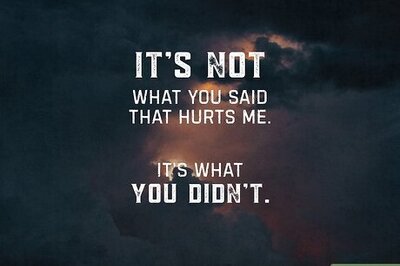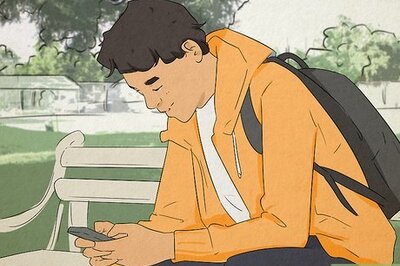
views
You know her and have hated her. But being despicable on screen every day and being loathed by an entire nation for years is not for the faint hearted. Ashwini Kalsekar is anything but it—she is fierce, unapologetic and believes staunchly in hard work. Her prolific filmography is proof enough. Despite doing similar roles on television for years, she has seamlessly found remarkably different work in films—most recently in AndhaDhun and Simmba.
On International Women’s Day, she talks about strength, the good behind playing bad women and not giving up.
You’ve been acting for over 23 years now. How different do you think your journey would have been had you been a man?
My journey was beautiful because I am a woman. I got to play more powerful roles. I have had the best of time, have done the best of shows, especially on television, which is my home. It has made me stronger, more powerful. Wo jo kitchen politics wala mazza hai na jo logo ko pasand aata hai, wo nahi ho pata had I been a man.
Did you face any discrimination on set ever because you were a woman?
Never. In fact, I was respected more because of it. But this could also be because I have stuck to production houses for longer durations—first it was Fireworks, then Balaji. When you work with the same people for so long, your relationship builds up.
You played Kasam Se’s Jigyasa with such raw malice that you were one of the most hated women on Indian TV at one point.
I was at a mall in Ahmedabad to promote Kasam Se when a woman came and told me ‘The way you’re treating Bani, mujhe achha lag raha hai’. I initially thought she was complimenting me on my performance but she said ‘No. I want to see you throw her out of the house because whatever has happened in your life has happened in my life too. Aap Baani ko ghar se bahar nikalo.’ I actually felt bad for her.
I didn’t know what we were doing would have such an impact. That incident actually made me think if I was giving wrong ideas to people. But then I realised that she was deriving strength from my character ki Jigyasa jee sakti hai toh mai bhi jee sakti hu.
Was your family alright with you being hated so?
You know, I had fallen majorly ill in 2007. There was acute kidney infection and doctors had given up. But then when I was finally recovering, my mother told me to quit Kasam Se. When I asked her why, she said ‘Tum Baani aur uski behno ko jo itna satati ho, women curse you. That’s why you have fallen ill. So you leave Kasam Se. I told her that I want them to curse me more so that I grow bigger.
In fact, when I was meeting Murli’s (her husband) mother for the first time and he told her who I was, she was like ‘Arrey wo! Usko kyu la rahe ho?’
And then you played Mahamanga in Jodha Akbar…
So many people tell me even now how much they hated me as Jigyasa and then as Mahamanga. But they always say ‘Though we hated what you did but we would wait for you to come on screen. You really played that character!’
Thanks to Kasam Se and Jodha Akbar, you were stuck playing the vamp for the longest time. But then you started doing films. How did that shift happen?
Until Kasam Se, I had done only positive roles. But after it, negative ka daur chal gaya. Yes, I did get slotted. There was a time when no one thought I could play a positive role again. But you know, Mrs. Hamid Ansari (India’s former Vice President’s wife) spoke to me for 20 minutes to just compliment me on my portrayal of Mahamanga. She even invited me to the Rashtrapati Bhawan.
Slot toh hona hi hai TV me, and not just your character, but also your look sometimes. I am still remembered as the badi bindi waali jo bohot sara kajal lagati hai—my Kasam Se look. But that’s the interesting bit—despite being slotted, I never got similar work in films. For instance, in Simmba, I played a judge.
Don’t you think the content on Indian TV needs a major overhaul?
Things are changing but television caters to only what people like to watch. They play TV as a video game. Poore TV ko jhaad ke agar naya graphing bhi kar denge na, koi dekhega nahi. As an actor I feel kuch naya karne dijiye na, I’ll try my best to entertain but who is going to believe just me? What if pasand nahi aaya? So everyone is playing safe. Even if you try to get a Mirzapur on TV, people will say hum online hi dekh lenge na. Why should we watch it with half-an-hour ads? I am all for change, even if it takes time.
Read: Knowing Jaya Bhattacharya, the Bad Woman of Good Old Indian TV
Read: Is Bollywood Now Comfortable Featuring TV Stars as Film Leads?
With more platforms today, the boundary between TV and film is blurring quicker than ever before. However, there is still discrimination against TV actors. Do you agree?
Not at all. It’s a myth that film actors disrespect or tag television actors because any person who has worked on TV for more than a year is a seasoned actor—he/she will prepare 10 pages of dialogues in half an hour and be ready. You don’t get such rigorous training anywhere else. I am not a trained actor. Whatever I know is from doing TV. But today, everyone knows that even if you give me 50 lines the last minute, I’ll do it well. Hum TV waalon me wo energy hai, wo takat hai, wo jazba hai, hum logo ko aadat hai. And everyone respects it.
What is the one thing that you’d want to change about the way the TV industry functions right now?
Because we have to generate episodes on a daily basis, TV actors don’t get even two hours to work on a scene. Sometimes we get pages fresh out of Xerox. And then you just come, perform and move on to the next scene.
Actors should get their scenes at least two days in advance so that they get the time to think, prepare and work on them. We need to have readings, meetings and rehearsals like films. It will give us more clarity and even save producers a lot of money.
They can also work on hairstyle and make-up. Yaha toh ek baar jo ho gaya wahi chalta hai. Bas kapde badlo. I don’t know where the fault is because A will blame it on B and B on C. I love television but in the mad rush to generate content, the quality suffers.
Follow @News18Movies for more.


















Comments
0 comment